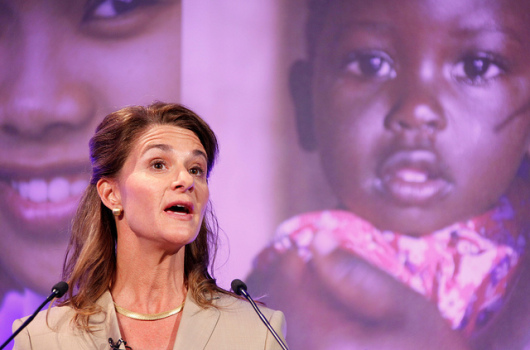"Data Holds Power." A Big Plan from Melinda Gates to Help Close the Gender Gap
/
While the 1995 World Conference on Women held in Beijing was seen as a turning point for global gender equity, the U.N.'s Women Deliver Conference in Copenhagen this week may mark another significant turn of events for women’s empowerment. The conference kicked off with a surprise announcement by Melinda Gates of an $80 million investment from the Gates Foundation designed to “close gender data gaps” and empower women and girls worldwide.
We knew the Gates Foundation was trending in the direction of funding for women’s empowerment, but this initiative suggests that the trend is here to stay. Why? Because data collection is typically phase one when the foundation goes big in a funding area. The next, more extensive phase, is intervention. And in that department, the Gates Foundation, and philanthropy in general, has only scratched the surface of the work to be done for gender equity.
The idea behind the new commitment is that “data holds power,” and that, by measuring the problem of inequality for women, we can begin to develop ways to tackle that problem.
This commitment comes within the context of growing partnerships across philanthropy and government. These partnerships emphasize that better gender data is critical for global development. Today, the U.N. released a statement, along with the Gates Foundation, the Hewlett Foundation, and U.S., U.K., Australian, and Canadian governments, among others, committing to an agenda that accelerates progress toward gender equality.
"By adopting the SDGs (Sustainable Development Goals) the world agreed to achieve gender equality by 2030. But we cannot close the gender gap without first closing the data gap," said Melinda Gates.
As we've reported, the Hewlett Foundation last year arrived at that same conclusion, embarking upon a new initiative that gives special attention to data collection on women's economic activities. Right now, women's economic contributions are only dimly understood in developing countries, in part because so many women work in the informal economy. These blind spots make it hard to develop good economic policy—including approaches that ensure more opportunities for women.
Related: Hewlett Shines a Flashlight at Forgotten Women's Work in Poor Countries
With this funding, Melinda Gates is advancing a bigger vision: Using data to hold the world accountable on its newfound agreement to prioritize gender equity. The $80 million will fund a wide range of data collection efforts, including those that determine how much time women and girls spend on unpaid work around the globe, and how this impacts their ability to become educated, join the workforce, and develop economic security. The funding will also investigate programs and interventions that are addressing gender equality, and support efforts across government that are promoting gender equity.
This high-profile announcement by Melinda Gates is yet another indicator that's she stepping up her global leadership on women's issues, and swinging more of the foundation's resources behind her. Earlier this year, we explored the various signs that Melinda is forging a new path in philanthropic work that puts gender front and center. Most notably, she created her own unit within the Gates Foundation, Pivotal Ventures, that has a big focus on gender equity.
And just how much has women's empowerment become a top priority for the Gates Foundation writ large? Has the foundation's grantmaking in this area already moved beyond the 5 to 7 percent mark, beating out the overall amount that researchers estimate foundations give specifically for women's and girls' initiatives?
That's hard to say, since grants that touch on women are distributed throughout the foundation’s giving areas. From a search of the Gates Foundation’s grants database, it appears the foundation is steadily making more grants in this area. For example, in 2012, a rough count found that the foundation made 26 grants addressing women’s needs in some way, while in 2013, it made 48 such grants; in 2015, Gates gave 69 grants toward women and girls across all grant areas for the foundation. The amounts of these grants have also grown steadily, with more recent grants ranging into the millions, such as a $3.7 million grant in 2015 to the International Food Policy Institute, for the purpose of better understanding “the impact and pathways of self-help groups on women’s and children’s nutrition in India.”
Some past grants have specifically focused on data collection. As we've reported, Gates partnered with The Clinton Foundation in 2014 to fund No Ceilings and the Full Participation Project, the largest data research and analysis projects to date on the global status of women. Gates made a $2.1 million grant to the Women’s Philanthropy Institute last year to explore questions related to women and giving.
So it appears the Gates Foundation is taking the gender equality agenda seriously. It’s not a sideline, not a once-and-done. We'll be watching to see how far the foundation pursues gender equality—powered by new better and data.
Related:Pay Attention: The Most Powerful Woman in Philanthropy Is Zeroing in on Gender Equality








